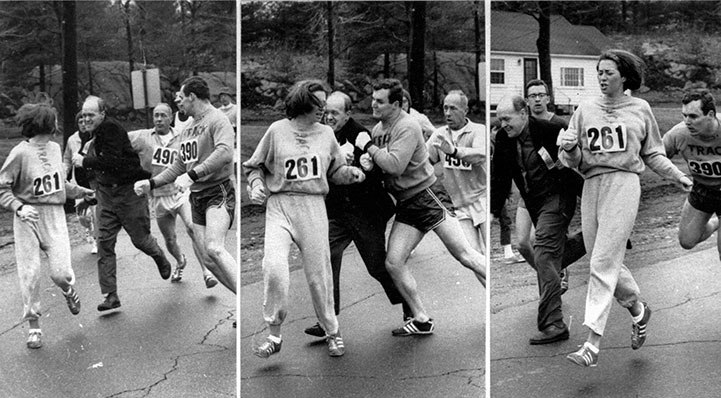“Gender equality is not a battle of the sexes – it is about one half of humanity supporting each other,” Elizabeth Broderick, Sex Discrimination Commissioner.
In 1967 a nineteen year-old student at Syracuse University, Kathrine Switzer, was unofficially training with the men’s cross-country team because there was no female running team. A 50 year-old bloke named Arnie Briggs, was pleased to see a woman interested in running and began coaching her. After listening to his endless stories about the Boston Marathon Kathrine declared she wanted to run it. After Kathrine ran Arnie into the ground (literally, he passed out when she lengthened one of their training runs) he agreed to help her.
So on April 19, 1967 Kathrine lined up to run the Boston Marathon. The night before when the nerves kicked in she rang her Dad, he really had no idea what his daughter had got herself into but he did what parents do and told her “Aw hell, kid, you can do it. You’re tough, you’ve trained, you’ll do great!”. Officially registered as K V Switzer she was given a race number, and with her boyfriend Tom Miller, coach Arnie and a running mate from the cross-country team John Leonard, she began the race.
The year before Roberta Gibb had jumped into the race and finished it, although she had not been an official entrant.
Unfortunately for Roberta, she didn’t get a Time Photograph of the Year Moment.
It happened at the around the four mile mark, race manager, Jock Semple, realised he had a woman running in his race and tried to physically remove her from the course. Kathrine’s burly boyfriend shoulder charged the official off the road. The moment was caught on film. Kathrine kept running.
Now because this is real life and not a Hollywood movie a few more miles in Tom realised he might have just destroyed his own Olympic chances by assaulting an official and decided it was Kathrine’s fault. The two, in what I regard as one of the greatest feats of athleticism ever, proceeded to have a full on barney as THEY RAN A MARATHON. Tom ditched his race number and took off ahead of the group. Kathrine kept running.
Arnie and John stayed by her side. They decided times didn’t matter but it was sure as hell important that she finish this bloody race now they were the centre of the press pack’s attention. Kathrine kept on running.
Later in the race they caught up with Tom, who hadn’t trained for the event and had basically came along for the ride because is girlfriend was having a crack at running it. Tom was now walking, he badgered Kathrine to walk with him. Kathrine kept on running.
Four hours and 20 minutes after she had started Kathrine crossed the finish line with Arnie and John, her feet blistered and bloody. Tom made it to the end too, over an hour later.
After this event, Kathrine became committed to creating running events for women all over the world, it took until 1972 for women to be “officially” welcomed to the Boston Marathon, and it went to Jock Semple to do the task, he conceded he was impressed with their performance. In the end he and Kathrine became “great friends”. In 1984 Kathrine was instrumental in getting the women’s marathon included in the Olympic Games.
Kathrine Switzer became the first woman to officially complete the Boston Marathon because she trained long and hard and she kept on running. However, along the way, at key points, men stood by her to enable it to happen, and some managed to both help and hinder simultaneously, hey Tom wasn’t perfect but at one key moment his body slamming abilities were crucial to the outcome.
Could she have done it without them? Possibly, but given the times it would have been bloody tough.
Read Kathrine’s full account of the day here or here.
The lesson I really believe we should have learned from the last 40 years of trying to have it all is that we can’t do it alone.
Men still hold the power, the way to move forward is to ensure that we are engaged in a conversation on how to better distribute that power. I’m not suggesting that men will fall to their knees and say “my god we’ve been shits, here take it, take it all”. I am suggesting that with discussion, negotiation and participation we can make changes together. I know I sound idealistic but I can’t see how we can go any further without the fellas help. That’s not a sign of weakness it’s just a reality.
And it is no coincidence that the group is being led by three male MPs. Watts says that not only do men need to show leadership and take responsibility for the problem, “there are some men who will only hear these messages if they’re coming from other men”.
“When looking for a life partner, my advice to women is date all of them: the bad boys, the cool boys, the commitment-phobic boys, the crazy boys. But do not marry them. The things that make the bad boys sexy do not make them good husbands. When it comes time to settle down, find someone who wants an equal partner. Someone who thinks women should be smart, opinionated and ambitious. Someone who values fairness and expects or, even better, wants to do his share in the home. These men exist and, trust me, over time, nothing is sexier.”
― Sheryl Sandberg, Lean In: Women, Work, and the Will to Lead
My ambition shifted when I had kids in a way that I didn’t anticipate. I became more ambitious for my life as a whole, and for that kind of health and happiness of the overall family unit. And that very much includes my husband and very much includes me. My husband is always the one saying to me, ‘You have to work, you have to work. This is part of who you are. We’ll figure it out.’ That’s powerful, when your partner has that serious mantra.






I think it takes “great” men and “great” women working together to make great things happen. By “great”, I mean people who genuinely want to see/help their peers and families achieve their ambitions and are totally supportive whenever thier support is needed. These people are gems.
Yes, yes, yes.
This is an excellent story to kick off the series, I’d never heard it before, I suppose because I have zero interest in sport. I think that feminism offers huge potential for both men’s and women’s lives to be much better, and anyone who isn’t seeing that is pretty stuck.
I suppose some women have had such bad experiences with men they can’t see the good in them and are understandably cynical – especially if they’ve worked with victims of sexual abuse or violence, but being too hardline about anything will just alienate potential allies, both male & female.